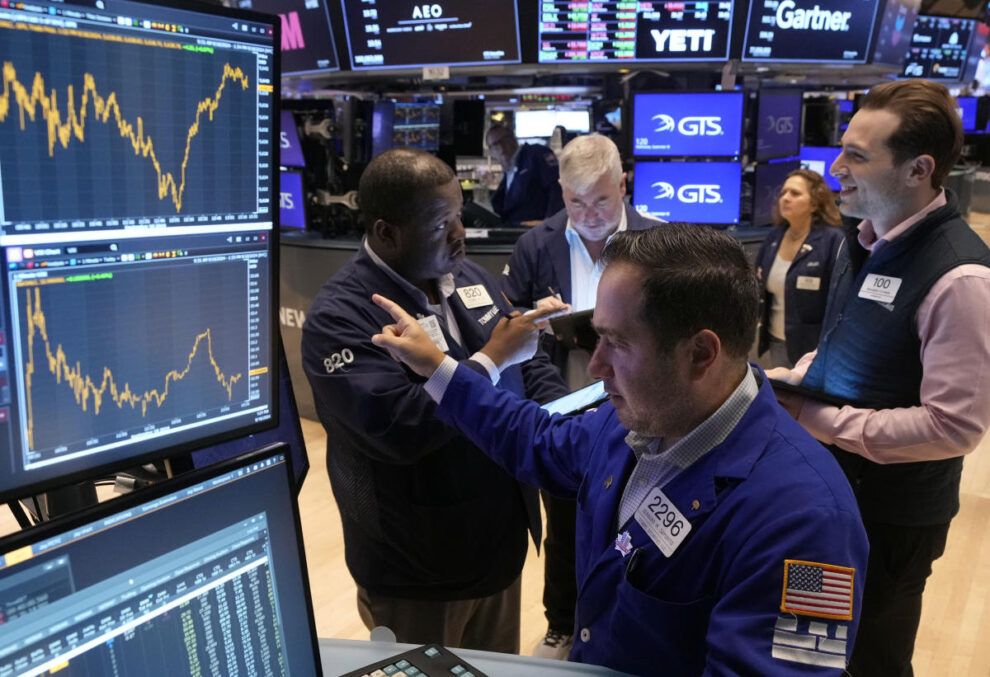Global stock markets are now entering what is set to be an eventful fourth quarter, with the US election and more interest rate decisions looming.
Markets continued to rally to round off a strong end to the third quarter, with the S&P 500 (^GSPC) closing at a new record high on Monday.
However, US stocks fell on Tuesday, as investors digested the latest jobs and manufacturing data, as well as comments from Federal Reserve chairman Jerome Powell, who said policymakers aren’t in a hurry to lower rates.
This tempered traders’ bets of another 0.5% interest rate cut, after the Fed recently announced its first rate reduction in four years, lowering its range by a bigger-than-expected 50 basis points.
Read more: UK GDP grows less than first thought over spring
The European Central Bank also made its second 25 basis-point rate cut of the year in September. And while the Bank of England kept rates on hold at its latest meeting, it had already announced a rate reduction in August, with markets betting on a next cut in November.
Keeping an eye on central bank policy decisions and monitoring how effectively rate setters can navigate a “soft-landing” for the economy, as more jobs and inflation data are released, is one focus for asset managers and market strategists in the fourth quarter.
But the major market event on their minds is the US presidential election on 5 November. With the outcome of this still unclear, the theory is that many investors decide to “move to the sidelines” in the run-up to that date and await more clarity.
‘Significant turnaround’ in markets
Henry Allen, macro strategist at Deutsche Bank, said in a research note released on Monday that this recent rally marked “a significant turnaround from earlier in Q3, when there was major turmoil as US recession fears grew”.
One of the factors behind this shift, he explained, was the pivot in central bank policy.
In addition to this policy pivot, Allen said the fact that US economic data had started to improve again, had also bolstered market sentiment. For instance, the four-week average of initial jobless claims was now down to its lowest point since May and non-farm payrolls were up by 142,000 in August.
He added that the Atlanta Fed’s GDPNow estimate, which acts a model for real gross domestic product (GDP) growth, is now up to 3.1% from 2.9% for the the third quarter, while other “indicators like retail sales and industrial production have also pointed away from a recession”.
What’s more, last week’s stimulus announcements by China’s central bank led to “phenomenal performance among Chinese equities, along with China- exposed stocks more broadly”.
Read more: Funds set to benefit from falling interest rates
In fact, the Shanghai Composite (000001.SS) index closed Monday’s session in China 8% higher, which was its largest daily increase since 2008.
In the UK, while the FTSE 100’s (^FTSE) gains have been smaller year-to-date, up nearly 7%, it still reached an all-time high of 8,445.8 in May and stood at 8,273 on Tuesday afternoon.
“Given how strong things have been for markets recently, there’s understandably been some scepticism as to whether this can continue,” said Allen.
However, he added that there are “still clear signs that investors are pricing in a higher-than-usual chance of more negative outcomes like a recession” in the US.
If economic growth does hold up and the Fed manages to ease into a soft landing, Allen said that the “historical precedents from here are very positive for markets”.
Fourth-quarter investment outlook
Hugh Gimber, global market strategist at J.P. Morgan Asset Management, told Yahoo Finance UK: “I guess the summary for Q4 – there are a number of big unknowns, all with big implications for the outlook for 2025.”
He said that the result of the US election is still as unclear as it was at the beginning of year and “all potential outcomes are still on the table”.
Gimber, therefore, said the “focus should absolutely be on ensuring that investors are avoiding being overly exposed to any one particular outcome”.
He said that a second key topic for the fourth quarter is “how much an acceleration in the weakening of the [economic] data do we see”.
Another topic Gimber said he is focused on in the fourth quarter is a “broadening out of earnings”.
Read more: The top gold funds to invest in as prices soar
He expected to see earnings growth in the mid-teens in both the ‘Magnificent Seven’ group of technology giants, which includes Nvidia (NVDA) and Apple (AAPL), and the rest of the S&P 500.
“You compare that to Q1 of this year, where the Magnificent Seven were growing earnings by 50% and the rest of the market was in negative growth territory,” Gimber explained.
Even so, Gimber said artificial intelligence (AI) will continue to be a big driver for markets, but is more focused on some of those “left behind sectors that stand to benefit from almost a second round effect from AI effectively”.
“There’s a fundamental disconnect today being priced as if they’re going to completely revolutionise the economy and then everything else,” he said. “That gap has to close one way or another.”
Gimber said that the utilities sector was one example of a “clear AI beneficiary” with the increase in electricity demand that going to come from data centres. The healthcare sector was another example of an area he is focused on.
Read more: European Central Bank forecast to cut interest rates to 2.5% in 2025
Going into the fourth quarter, he said that it’s key to ensure portfolios are positioned to be “resilient to the multiple potential outcomes that can stem from the US election”.
He explained that inflation risks have faded and central banks stand ready to cut rates in the event of a shock to economic growth and in that scenario “multi-asset investors have many more tools available to build a well-diversified portfolio, mixing risk assets with high-quality government bonds than they did in 2023 or 2022 when inflation levels were still higher”.
“This is a good opportunity to be rebalancing portfolios away from the previous winners and tilting into sectors that have been left behind, particularly those with a more defensive tilt – utilities and healthcare being two examples,” he added.
US election outlook
Ajay Rajadhyaksha, global chairman of research at Barclays (BARC.L), said in a fourth-quarter outlook note in September that the US election would have “far-reaching consequences” for the world, explaining that a second presidency for Donald Trump would “likely see a new global trade war”.
The former president and Republican candidate has proposed blanket tariffs of 10% on all US imports and tariffs as high as 60% on Chinese goods.
“Other countries would retaliate, with uncertain but serious effects on economies and markets,” said Rajadhyaksha.
If Democratic candidate Kamala Harris is elected, he said that a “gridlock is more likely … with far less dramatic policy changes”.
“But the presidential race is so close, and US politics so partisan, that markets will keep guessing until 5 November,” said Rajadhyaksha. “The result could lead to starkly different winners and losers in global markets.”
Read more: What are share buybacks?
Given that “policy paths post-5 November are so binary”, he said that “many investors will probably move to the sidelines and wait for clarity”.
“Markets seem to lack conviction going into Q4, and frankly, so do we,” he added.
In terms of how this translates into investments, Rajadhyaksha said Barclays’ “bias is to be overweight risk assets, short core fixed income, and own the trade-weighted USD (US dollar)”, which measures its value relative to other currencies.
“But we would not be surprised if all markets are range-bound in the coming weeks as they wait and watch economic and political developments in the US. For the rest of this year at least, as America goes, so goes the rest of the world,” he added.
With regards to equities, Rajadhyaksha and his team said that in the US they maintained their positive outlook on the “big tech” sector and had upgraded their outlook on utilities stocks to positive.
Post-election impact
Meanwhile, Themis Themistocleous, head of the UBS (UBSG.SW) EMEA investment office, said to journalists at a recent outlook event that he would expect the “outcome of the [US] elections is more likely to be felt at a sector level rather than the overall level of the equity market”.
He said there would be more defence spending irrespective of who becomes president.
However, he added: “I suspect if Trump becomes the next president then the level of noise is going to go up even more and as a result, maybe decisions need to be taken even faster than otherwise. So in some ways I would suspect the defence sector to benefit overall, but obviously a Trump win most probably will accelerate that appreciation.”
If Harris wins, on the other hand, Themistocleous believed there would more likely be a continuation of current trends, such as support on the energy transition.
Read more: Top fund picks for self-invested pensions
“And of course, as we know, a lot of European companies have leading positions in some of these technologies like in green tech, so [there would be] continued support there,” he said.
In this scenario, Themistocleous said there were a number of industrial and utilities companies that could benefit.
Meanwhile, he highlighted luxury as a sector that could be impacted in different ways if Trump becomes president.
“If we have tax cuts in the US that would support the upper consumer segment in the US which buy those things so that could be positive,” he said, but added that any significant impacts on China could also but pressure on the sector.
For those investors that might be looking at how to ride through any volatility from the outcome of the election, Themistocleous highlighted consumer staples and utilities as examples of defensive sectors.
However, he pointed out that this was very much a six-month to one-year view. Longer-term, Themistocleous also favoured AI as an investment theme with “multi-year development”.
In fact, the overriding message going into the fourth quarter seemed to be that, regardless of any short-term volatility on the horizon, investors should continue looking for those companies that facilitate and benefit from structural changes in the economy.
Download the Yahoo Finance app, available for Apple and Android.










